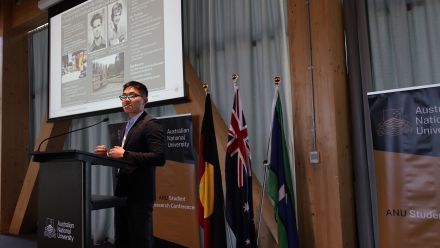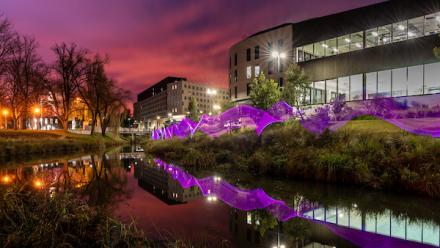VC's update – International Women's Day
Hello everyone
Every time I give a talk on the accelerating universe I have to confront the fact that the team I lead that made this discovery consisted of 20 men, and no women. While it reflected the overwhelming male make-up of my discipline in 1994, it did not have to be that way, and yet I let it happen.
I was born into a family where my mother and two grandmothers were feminists of their age with highly supportive husbands. I witnessed firsthand the complex trade-offs women were forced to make in their lives as they pursued their own aspirations. This upbringing gave me a strong bent towards feminism that was sometimes a source of ridicule. I have, from the earliest time I understood the meaning of the word, considered myself a feminist, and proudly used the term to describe myself throughout my life.
So how then did I get it so wrong in 1994? After decades of reflection, it comes down to a single foundational mistake. Despite my upbringing and my beliefs, I somehow didn't think about it. And without thinking about it, I didn't take action. And when I did think about it in 1996, it was too late to make meaningful change, as the team and roles were fixed.
But since then, I have thought about gender representation in everything I do and done my best to take action. It is not an accident that half my PhD students have been women, half my postdocs too. Half my Executive and Council. I have put a 50/50 aspiration on everything I have done over the past 25 years. It has neither been hard nor easy, but has been achieved by making sure women were given a 50/50 chance at success in every studentship or job. But opportunity is not sufficient; we also need an inclusive and safe environment that supports women's success throughout their careers.
So, while I am proud of progress over my six years as Vice-Chancellor, I acknowledge we have much to do. Our workforce is less, but still highly gendered. And my experience shows that as soon as focus is removed on progress against 50/50, areas often revert to traditional representation. But mostly the changes stick.
Inequity across gender has been a focus of International Women's Day this week - but we have inequity across many intersecting dimensions. Every day and in every way we need to look at ourselves and acknowledge these inequities, and work to remove them, so that every person sees ANU has an inclusive environment that supports their life's aspirations.
ANU also continues to invest in research in these areas through our Gender Institute and Global Institute for Women's Leadership (GIWL). I am handing over the rest of the blog to GIWL's Elise Stephenson, who has recently arrived from Queensland. Elise, over to you...
Dr Elise Stephenson writes
Another International Women's Day rolls around, and I am glad, and proud, of the opportunity to celebrate. At GIWL this IWD, we aimed to invert common traditions of a celebratory IWD morning tea that the women of the office stayed up cooking for the night before, or events filled with CEOs on the stage, organised and run efficiently by fleets of women admin officers and event organisers behind the scenes. Instead, we wanted to have a real talk with young leaders at the forefront of a new wave of gender diverse leadership.
Titled 'Truth to Power', hosted by GIWL at the Kambri Cinema, ANU, we drew on the examples of Grace Tame, Brittany Higgins, Chanel Contos and more young women who serve as lightning rods for national change. Our event explored the power of young people to diversify the voices and experiences that we hear through our established social and political power structures - those who are driving new forms of genuine change or shaking up old patterns.
Latoya Aroha Rule, PhD Candidate at Jumbunna Institute for Indigenous Education and Research at the University of Technology Sydney, researches Aboriginal women leading the movement to stop Aboriginal deaths in custody. Motivated to lead the campaign to #BanSpitHoods after the death of their brother Wayne Fella Morrison in 2016, Latoya highlighted the importance of colonial decay, and of reimagining who and what constitutes leadership. A thoughtful activist to the core, Latoya 'called in'* the limitations of campaigns circulating around IWD that continue to marginalise First Nations voices and advocated for attention to be paid to Indigenous and transwomen, often marginalised in feminist activism.
Another advocate for increasing intersectionality was Yasmin Poole - a Q&A frequent, Youth Influencer of the Year recognised by The Martin Luther King Jr Center, and part of the #SafetyRespectEquity campaign newly launched this week. She asked the audience to act on creating diverse spaces across gender, ethnicity, sexuality, class, disability, and other factors. No one person embodies all experiences across the gender spectrum, and the unique challenges and opportunities of a transwoman from an isolated community in the Northern Territory, a First Nations young person from inner-city Meanjin, or older urban professional from Canberra all need to be heard and included - whether that be in research, politics, business or beyond.
Our third panellist, Varsha Yajman, argued another angle to the take-down of what we think we know about power and leadership. Varsha was famously involved in the High Court case against Minister for the Environment Sussan Ley over her duty of care to avoid causing injury to young people while exercising her powers to approve a new coal project. Varsha spoke of the elitist exclusionism of being titled an activist after her high-profile work, particularly as she watched others who had worked hard for the cause for decades remained unseen, unlabelled and under-recognised. She asked us to be critical of titles - often a form of gatekeeping and not truly representative of those doing the work. The panel encouraged us to think of lived experience as a form of expertise, even without the title or formal recognition.
What I loved from this panel was not that we focused on how these people 'made it' or navigated the challenges of being different in spaces dominated by other bodies and types of people. I loved that it communicated that the fight for liberation of female and gender diverse people is not static, but rather a fluid, evolving movement with involvement still required and more consideration to be paid to the perspectives of marginalised voices. There is, however, no lack of energy and motivation in facing these challenges creatively and directly. Each panellist could point to moments in the past that inspired and pushed them towards advocacy and activism. I walked away from this event feeling inspired by the countless paths that could lead to collaborating for a better future - and even more heartened that this road will never be walked alone.
As our Director, Professor Michelle Ryan, highlighted at the start of the panel, the ability to have one day to bring gender into focus remains important, but the focus should naturally extend beyond just one day too. The question for me remains: how do we ensure that each gain for gender equality is not made to the exclusion of consideration of all else, and that other forms of progress, not made to the exclusion of gender?
*Calling in, as opposed to calling out, involves conversation, compassion and context to advocate or ask for change.
Dr Elise Stephenson
Research Fellow, The Global Institute for Women's Leadership, ANU


